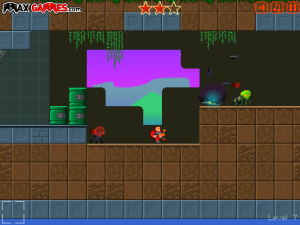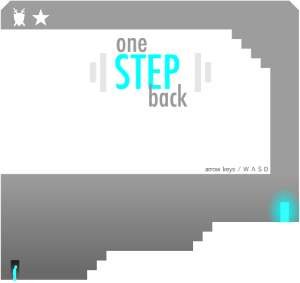Absorbed is a fast paced, side-scrolling, level based platformer in which you have a gun which can suck in, and then shoot out, just about anything. You’re likely to be reminded of the gravity gun from Half-Life 2, and that could have been an inspiration but the Absorbed gun, like the game that it’s in, operates much faster.
Actually, I’m playing through the developer’s other games on Kongregate now and speed seems to be emphasized in most of them – very quick and short levels. It’s nice. It’s satisfying to blow through ten levels in five minutes, especially when each one involves lots of fast things happening quickly. Feels like you’re really getting things done.
 Control in Absorbed is responsive, as it needs to be, with a couple of caveats: You can’t shoot if there isn’t room for the projectile to appear in front of you, in other words there needs to be some space between you and your target. This will get you killed at least once. A second thing is that levels are all set up on a grid, everything is super linear, except for your projectiles – they are effected by gravity and they curve as they travel. But not very much. They almost shoot in a straight line, and just about every design element suggests that straight lines are the good and proper way for things to move, but your projectiles don’t quite do that. It’s a minor thing but it makes aiming difficult in some cases. I think it’s an interesting point how much the visual design can impact your expectation of movement.
Control in Absorbed is responsive, as it needs to be, with a couple of caveats: You can’t shoot if there isn’t room for the projectile to appear in front of you, in other words there needs to be some space between you and your target. This will get you killed at least once. A second thing is that levels are all set up on a grid, everything is super linear, except for your projectiles – they are effected by gravity and they curve as they travel. But not very much. They almost shoot in a straight line, and just about every design element suggests that straight lines are the good and proper way for things to move, but your projectiles don’t quite do that. It’s a minor thing but it makes aiming difficult in some cases. I think it’s an interesting point how much the visual design can impact your expectation of movement.
Neither of these are deal breakers. On the positive side of things, there’s not a lot of bullshit here – almost no backtracking to re-use old projectiles, and neither do you have to be very conservative with what you shoot. This, and the fact that you can bypass a lot of puzzles by abusing your own fragile body, makes for a pretty easy game, and a quick run through, but as I said: speed seems to be a theme with this developer and that’s an asset. Going back and earning all the stars offers some additional challenge if you find it too easy the first time. (You earn stars by avoiding death, none of that annoying collection business.)
The developer’s name is Danil Zhuravlev. Like I said, I’m playing what I can find of his now and some of his games are more original than others, but they all show some care put into them. I don’t know why I haven’t heard of this guy before.
